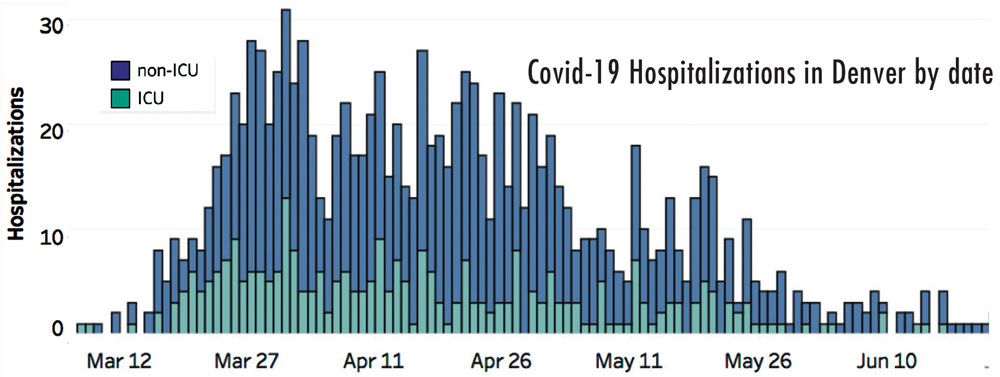
On June 22, Denver had 2 non-ICU hospital admissions.
Though Denver was on target for hospitalizations, testing and positivity rates as of June 24, officials stated strongly that masks need to be worn “for the foreseeable future.” To be sure we don’t lose the progress we’ve made and can continue gradual openings, “Keep wearing masks where required and even where not required,” said Mayor Hancock in a press conference on Covid-19 status in Denver.
Free testing continues at the Pepsi Center. Denver has been meeting its target of 150 tests per 100,000 people (1,100 tests a day.) The positivity rate on June 24 was 3% and will need to stay at 5% or lower to continue the gradual openings.
Libraries: Bookdrops in Park Hill, Stapleton and Lowry, among others, are open. Curbside service will begin by appointment on Tues. July 7.
Parks: Playgrounds are open but not sanitized, frequent hand washing or sanitizer is recommended. Recreate in groups of 10 or less, distance yourself by 6 feet, masks are recommended.
Covid-19 Articles of Interest
The Front Porch selected the following articles to offer additional understanding of the coronavirus. They can be found at TheConversation.com.
How the coronavirus escapes an evolutionary trade-off that helps keep other pathogens in check
Viruses walk a fine line between severity and transmissibility. If they are too virulent, they kill or incapacitate their hosts; this limits their ability to infect new hosts. Conversely, viruses that cause little harm may not be generating enough copies of themselves to be infectious….
Older people tend to get highly destructive infections, while younger hosts, although just as infectious, remain largely unscathed…. [The] age-based pattern of SARS-CoV-2 permits it to have its evolutionary cake and eat it too: ravaging older individuals with high virulence, yet maintaining younger individuals as vehicles for transmission.
By Athena Aktipis, Asst. Prof. of Psychology, Arizona State University and Joe Alcock, Prof. of Emergency Medicine, Univ. of New Mexico
Can people spread the coronavirus if they don’t have symptoms? 5 questions answered about asymptomatic COVID-19
When people do get sick from the coronavirus, it takes on average of five days and as many as two weeks to develop symptoms that can range from very mild to extremely dangerous…. A recent mass testing campaign in San Francisco found that 53% of infected patients were asymptomatic when first tested and 42% stayed asymptomatic over the next two weeks.
Another recent paper compared the evidence from 16 studies and estimated the overall rate of asymptomatic infection to be 40%-45%. Though none of these studies is perfect, a lot of evidence supports a true asymptomatic rate of around 40%.
Compared to most other viral infections, SARS-CoV-2 produces an unusually high level of viral particles in the upper respiratory tract – specifically the nose and mouth… Researchers have found that pre-symptomatic people shed the virus at an extremely high rate. Since SARS-CoV-2 is present in high numbers in a person’s nose and mouth, it is that much easier for the virus to escape into the environment.
Universal mask wearing is the best tool to limit transmission, and there is evidence to back that idea up… I and many other infectious diseases researchers are convinced that it [asymptomatic spread] is playing a major role in this pandemic.
By Monica Gandhi, Professor of Medicine, Division of HIV, Infectious Diseases and Global Medicine, University of California, San Francisco



My parents live in Stapleton and every time I visit, most of the kids I see around Founder’s Green and shops are not wearing masks. I just saw 12 kids in front of Chipotle, none with masks.